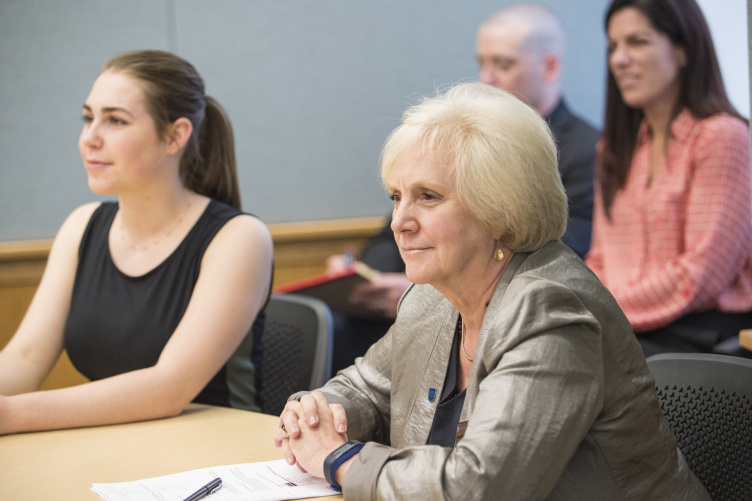
Paul College Dean Deborah Merrill-Sands Photo: Paul College
Peter T. Paul College of Business and Economics Dean Deborah Merrill-Sands has long been recognized for her work as an authority on women’s leadership and gender dynamics in the workplace, and now she’s been named one of New Hampshire’s 2019 Outstanding Women in Business.
The award, given annually by NH Business Review (NHBR), celebrates women who have excelled in their professional lives and as leaders and role models. A few days before Merrill-Sands was honored Feb. 13 at the 2019 Awards Ceremony and Dinner, she spoke of both her appreciation for this honor and her work as dean of a top-100 business school.
Before Paul College
On a wintry morning in her Paul College office, Merrill-Sands describes her unusual training for a business school dean: She earned her master’s degree and her doctorate in economic anthropology from Cornell University and went on to conduct research in the field of international development. “While our major issue today is climate change, at that time it was widespread food shortages and famine,” she says. “I wanted to have an impact, and that’s what I worked on for 15 years.”
Her training as an anthropologist and her work in the field would later come into play in efforts to see more women in business leadership roles.
"Change around gender equity is slow, but we’ll get there."
Merrill-Sands had received a post-doctorate from the Rockefeller Foundation to work for an international development research institute based in Holland that they funded alongside other international donors. She arrived to find she was both the youngest researcher and the only woman. “I learned a lot in that process, and fortunately, I had a very good mentor. He gave me strategic guidance and strategic opportunities. My learning curve was so steep in those first few years, I feel it set me up for everything else later in my career,” Merrill-Sands says. “When I decided to move home to the U.S., I received an offer to lead a change initiative to bring more women scientists into the research organizations that were part of the consortium.” She began working with diverse leaders from scores of backgrounds and nationalities across 16 research organizations worldwide. “That’s where my training in anthropology paid off in spades. I understood that gender is socially constructed and you have to look at it within the context of the cultures in which you’re working,” she recalls.
The Ford Foundation was one of the donors supporting this effort and, at the same time, was also funding a research team undertaking a similar change effort with the Xerox Corporation. "We were both addressing gender issues in the organizations by working with internal teams to change how work was done and surface subtle cultural norms that disadvantaged women,” Merrill-Sands explains. This led to a grant from Ford Foundation in the 1990s to form a center at the School of Management at Simmons College, known for its focus on women’s leadership, to bring that work together into a research hub and connect with other teams working internationally to bring about positive change.
“That was one of the most inspiring times in my career,” she says.
Her work with the center at Simmons would lead to her selection as associate dean and then dean of the college’s school of management before becoming dean of the Lorry I. Lokey Graduate School of Business at Mills College in Oakland, California.
Paul Pride
Merrill-Sands began her role as Paul College’s dean in 2015. “Here was this amazing opportunity of this newly named college and a beautiful new building. There was a nice match between what I aspired to do and what the college wanted to do, which was to go to the next level of excellence,” she explains.

During her interview process, she found herself becoming increasingly excited about UNH. “When I got here, I began to understand the importance of the role a flagship campus of a public university has in serving the state and the students who come here. I’m inspired every day by the ability that we have to give our students a transformative experience and open up a wide range of meaningful opportunities for them.”
From the beginning, Merrill-Sands partnered with her faculty and staff who wanted to raise the visibility and reputation of the college and its impact.
“This translated into a simple goal: we wanted to be ranked among the top-100 business schools in the nation, and we are now in the top 60! We have a lot of talent among our faculty and staff and we’ve got amazing students, but we just had not shone a spotlight on the exciting work happening here.”
One of the first steps they took to stand out among business schools was to launch the First-year Innovation and Research Experience (FIRE) program. Associate Dean Neil Niman pitched the idea to her within days of her arrival. “I said yes, and he and his team ran with it," she recalls. "It’s really become a foundational building block for our whole college now. We want our students to engage and see Paul College as their community, their ballast for their life at UNH.”
Today, survey results indicate FIRE is doing just that and helping students succeed academically and professionally, while key rankings show Paul College making the grade on the metrics that align with its long-term goals. “Paul College has a very aspirational culture,” Merrill-Sands says. “People are very invested in the success of our students and the college as a whole.”
Looking to the Future
Paul College will undoubtedly have a role to play in shaping the future of women in leadership. Merrill-Sands and the college’s faculty and staff are working to prepare their 1,100 women students for just that.
Merrill-Sands has made attracting more women to Paul College, where women currently comprise 41 percent of undergraduate students, and preparing them for leadership one of her priorities. Through a gift from alumnus Morgan Rutman ‘84 and his wife Tara as well as the Och Family Foundation, Paul College has launched the new Rutman/Och Advancing Women’s Leadership Initiative, which provides scholarship funding and special leadership development programming to high-performing women and men who are committed to advancing women into leadership in business. Merrill-Sands has also supported the Women in Business Club’s annual Women’s Leadership Conference at Paul College and hosts a co-curricular seminar on women’s leadership for students in the Paul Scholars program.
"I use Sheryl Sandberg’s book ‘Lean In’ during the spring semester of their first year. I don’t want young women to be demoralized about gender issues, but I want them to be savvy and strategic,” she explains. “Our goal is aspirational: Set your sights high. Of course you can do it. But one of the things you have to have in your toolkit is an understanding of how subtle gender stereotypes influence people’s perceptions of leadership and how that impacts women’s opportunities to develop as leaders.”
“Our goal is aspirational: Set your sights high. Of course you can do it. But one of the things you have to have in your toolkit is an understanding of how subtle gender stereotypes influence people’s perceptions of leadership and how that impacts women’s opportunities to develop as leaders.”
She cites a typical example of a female student in a group project who does everything for her team: Takes the minutes. Oversees the scheduling. Completes all the processes.
The student's reason? “I just want to make sure everything works well.”
“I will ask my students, ‘When you think of a leader, do you think of those skills?’ Their response is no,” Merrill-Sands explains. “So how are you positioning yourself? Yes, you are helping team effectiveness and that is important, but in some ways, you’re also undermining people’s ability to perceive you as a leader. This can be hard messaging. However, these are the kinds of tasks and skills that get ascribed to certain gender roles, and you have to interrupt that thinking. The question should be, 'How can I step up to mobilize the group to want to be successful?' That’s the leadership role.”
Merrill-Sands adds, “Change around gender equity is slow, but we’ll get there. As our women graduates move up in their careers and power dynamics come more into play, I want them to have strategic awareness and the tools to overcome challenges and seize opportunities.”
In the wake of being named one of NHBR’s Outstanding Women in Business, Merrill-Sands looks to the future: “It’s important to me that our students see that Paul College is moving in the right direction and achieving success with a woman dean at the helm,” she says. “There’s an added sense of responsibility to do a good job with this institution not only for all the usual reasons but also as a role model for these young women who are looking to see what their dean is doing — so they can see that yes, she is making things happen.”
Learn more about the many opportunities available at Paul College.
-
Written By:
Jennifer Saunders | Communications and Public Affairs | jennifer.saunders@unh.edu | 603-862-3585
















































